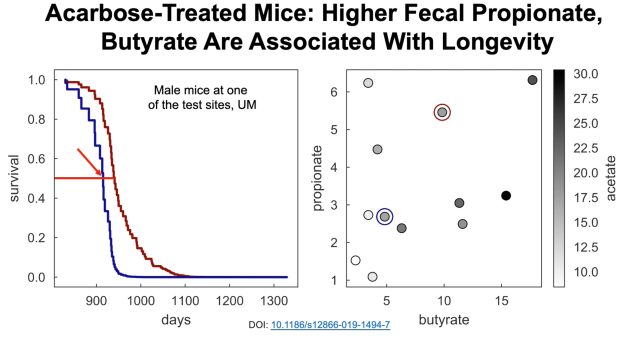Germ-free mice (animals don’t have a microbiome) live longer than microbiome-containing mice, but it’s impractical for people to live in a bubble for their entire lifespan. As a more practical approach, which microbiome-derived factors impact lifespan, and can they be modified?
Dietary supplementation with acarbose increases lifespan, and one reason for that may involve reduced circulating levels of glucose, but the other side of that story involves increased gut bacterial production of short chain fatty acids (SCFAs). Whether acarbose will increase lifespan in people is unknown, and with the goal of increasing lifespan, are there other ways to increase SCFAs?

Thank you for yet another interesting video!
– I would encourage to continue keeping up with human data only touched at the end of the video.
– Curious whether you came across metformin (to some extent there are similarities with ACA, I guess)
– Metformin increases Akkermansia muciniphila in human gut and possibly this particular strain might mediate the beneficial impact of metformin. There also works in progress for a specific probiotic.
– I am particularly interested to the gut-brain interaction. One point you might also investigate is about the pleiotropic effect of SFCAs and homeostasis: gut microbiota can also have deleterious effects in neurodegeneration (doi: https://doi.org/10.1038/s41583-019-0255-9)
– Curios about the mechanistic explication of the difference between male and female mice results.
– New to me the impact of exercise (in conjunction with higher fiber intake). Well done!
LikeLike